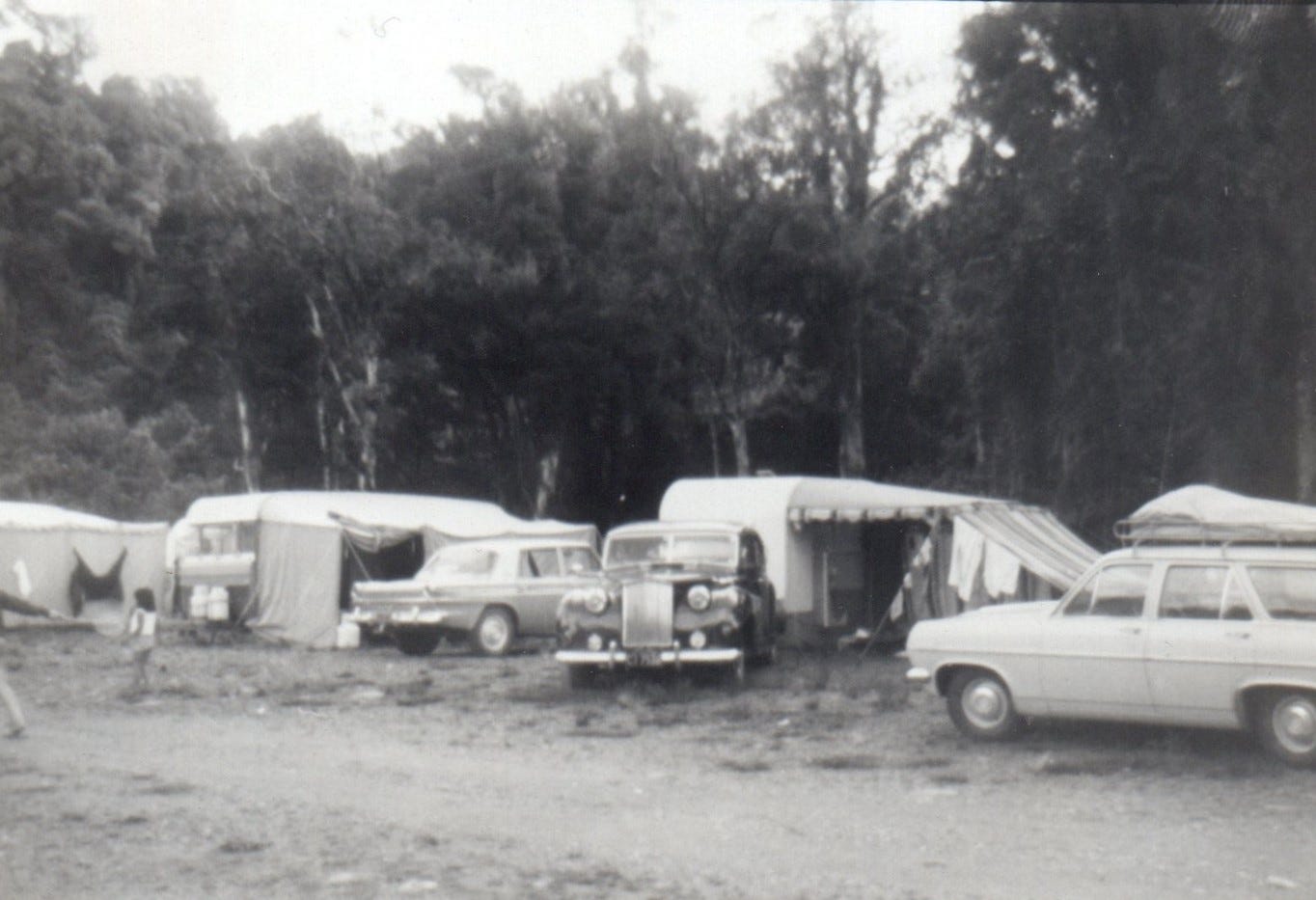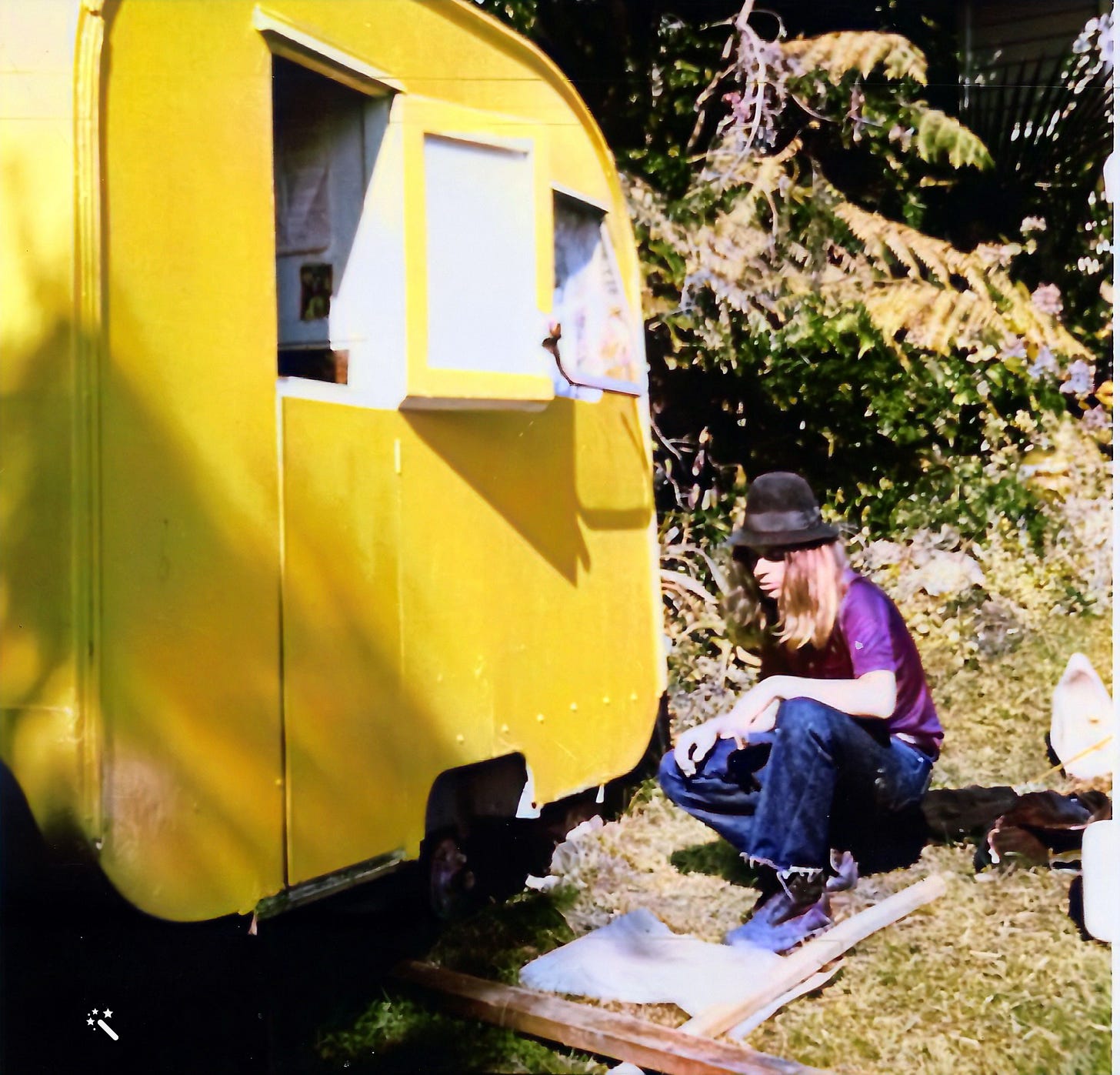In 1970 I came back to New Zealand after living with my grandparents in Holland for two years. I didn’t want to come back, I had been much happier in Holland than the preceding years at home, which were very stressful, when my parents had separated, and all the drama that preceded that. I begged my Oma and Pake (Fresian for Opa) not to send me back to New Zealand, but they explained that they had no choice, it was my parent’s decision to make, and they wanted me back. My grandparents decided they would come with me and stay for a few months to help me settle back in.
My parents had bought a little caravan and picked us up from the Greek cruise ship, Ellenis, when we berthed in Wellington on a warm day towards the end of October. 1970. My father had bought a huge Austin Princess limousine to tow it, from someone who couldn’t afford to run it anymore. It delivered 4.5 km of travel to a liter of petrol on the open road and 3 km to a liter in the city.
We spent the next month traveling around New Zealand, with my parents, my grandparents, me, and my little brother and sister. My grandparents slept in the caravan and the rest of us in the awning.
That’s one of my little sisters on the left in the picture below. She is 9 years younger than me.
Franz Joseph is one of the spots we visited. I have a couple of fond memories from there.
At the motor camp shop, they had pinball and a Have a Go arcade machine just beside the office. It turned out that I was really good at playing the Have a Go machine which paid out coins if you got the ball into certain slots. I mastered it and twice had to get the management to refill the hopper with prize money. Other kids watched and took turns, but I was like the Pinball Wizard.
By the third day, as we were leaving, with my pockets jingling with coins, there was a sign on it saying ‘Out of Order’. I suspect that the following day it would again be filling up instead of bleeding coins.
The other memory was a bit more unusual. You may have heard the saying that people are having a pissing competition. As you do at a summer camping ground, you make friends with other kids, which I duly did.
I don’t know how it came about, but the conversation got to who could pee the farthest and it was decided that we would have a contest. Now I was thinking this was a guy thing, only from the perspective that I never thought a girl would be able to compete, especially given we had a more natural body part to aim with. So we filled our bladders with drink and let the competition begin. Well, not only did she compete as we lined up on the bank of a creek gently flowing along the border of the motor camp, but she beat us!
Eventually, we arrived at our new home in South Titirangi Rd in the rain forest of West Auckland, after a month of touring New Zealand, where my parents had settled when they decided to have another go at getting their marriage together.
The house, with 5 acres of bush, including its own track leading all the way to Titirangi Beach, had been donated to Auckland Museum, where my father worked creating masterpiece exhibits. We could live there at a modest rent until the museum decided what to do with this bequeath.
My father was in the process of designing the Bird Hall, where he combined botany with art, recreating habitats of all sorts of birds from Gannets and Shags to a Moa. This hall was a centerpiece of the museum for many years. He was so skilled in making dioramas that it was often difficult to tell where the physical items and the painting merged.
The house had 3 bedrooms, and there wasn’t enough room for my parents, grandparents, my adopted brother, and sister. There were two sisters when I left for Holland in 1968, but they adopted one of them out and didn’t even tell me until I received a letter from them, explaining their rationale that she would easily find a home because she was of European descent. More on that one day. It was a bad move for many reasons. We have since reunited and her life was not the rosy one they had expected for her, and we all suffered from the fallout.
So when we arrived, my parents explained that there was not enough room in the house for all of us and asked how I would feel about sleeping in the caravan, it would effectively be my bedroom. I didn’t have to think twice. I was in like Flynn.
I set about decorating my caravan, making collages out of magazine clippings which became works of art on my walls and on the inside of the door. They included everything a teenager likes, semi-naked women, cars, guitars, and bands, but interlocked into a creative mosaic.
I had a portable record player, and quickly gained an awesome record collection, seeded by a set of records given to me by a family friend and journalist Sue Vaasen, who interviewed me about pop music and the generation gap.
As I got to the age of 15, I was well into enjoying my caravan, more as a home than a room. I had friends over, I could crank up music without being asked to turn it down. It melded with the outdoors and in summer, I was able to sit outside, as if it was my front yard, and play guitar, my favorite at the time was a National Diplomat Dobro, which you can see in one of my substacks about the Auckland Folk Festival.
Over the coming years, I would go on some journeys with my caravan. It was my room at school, and then at an urban commune, full of great musicians, and eventually, when flatting seemed more fun, I returned it to my parents in Titirangi. Obviously, there are some more stories to come.








